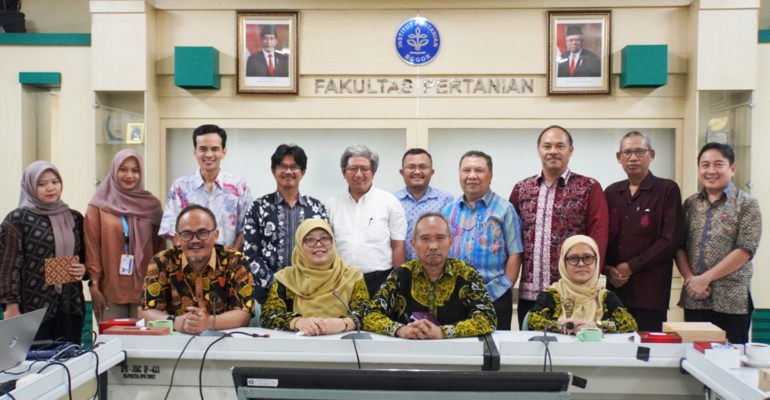IPB University Rice Experts Formulate National Rice Production Resilience Strategy

IPB University rice experts from the Senate of the Faculty of Agriculture, the Rice Research Group, and lecturers of the Agricultural Politics Course discussed strategies to strengthen national rice independence in a Focus Group Discussion (FGD), Wednesday (7/3). The FGD entitled ‘Resilience of National Rice Production, Retrospection of Self-Sufficiency’ was initiated by the Faculty of Agriculture and the Rice Research Group of IPB University.
“This FGD aims to gather and formulate thoughts, views and suggestions from IPB University academics. The formulation will be compiled and submitted as a policy brief from IPB University as an effort to stabilise and increase national rice production to strengthen the independence (self-sufficiency) of national rice production,” explained Prof Suryo Wiyono, Dean of the Faculty of Agriculture of IPB University.
In this forum, Prof Suryo presented an action programme for the implementation of fostering rice farmers using superior varieties of IPB-3S and IPB-9G in various districts in East Java, Central Java and West Java. He proposed the importance of optimising the use of dry and rainfed land for rice production using adaptive superior varieties.
Meanwhile, Dr Willy Bayuardi who is a plant breeding expert, explained the various innovations of superior varieties produced by IPB University since the release of the IPB-1R Dadahup variety to IPB-15S with high yield potential and various advantages.
“There is an interaction between varieties and the environment which is a consideration for recommendations for the use of certain varieties in specific locations,” explained Dr Willy.
The President Director of Perum Badan Urusan Logistik (Bulog), Prof Bayu Krisnamurthi, in his keynote presentation delivered a comprehensive and detailed overview of the global and national rice production situation and related external and internal factors. The supply and demand system as well as various operational measures in an effort to meet the adequacy, including supply stabilisation and price control of rice were also clearly stated by the President Director of Bulog at this forum.
In his dialogue, Prof Bayu, who is also a Professor of the Faculty of Economics and Management of IPB University, also mandated that the campus can voice ideas that are not only instant/short-term oriented, but strategic in nature for strengthening food self-sufficiency in the medium and long term.
In line with Prof Bayu’s presentation, Dr Ahmad Junaedi, Chairman of the Rice Research Group of IPB University, conveyed the urgency to mainstream the production increase programme through parallel efforts of extensification and intensification, accompanied by strengthening the provision of superior and quality seeds and optimal fulfilment of the necessary production facilities and infrastructure.
“The area of food, especially paddy fields per capita, will have implications for the availability of rice per capita. This ratio is very low in Indonesia, compared to Thailand, Vietnam, Myanmar and Bangladesh,” he explained.
The other main thing, he continued, is the strategy to increase the resilience of the rice production system from the conditions of climate anomalies such as El Niño and La Niña phenomena that threaten the delay of the planting season or crop failure due to drought and flooding.
Chairman of IPB University’s Tani and Nelayan Centre, Prof Hermanu Triwidodo, who is also a member of the Faculty Senate, revealed various conditions experienced by farmers today. He hopes that farmers’ rights can be fought for to improve their welfare and respect.
Prof Arif Hartono as an expert on soil fertility and fertilisation conveyed his experience in recording land fertility status indicated by soil pH, C-organic content, N, P-available, and K-available in paddy fields in Lampung, Banten, West Java, Central Java and East Java provinces.
“It is necessary to adjust the condition of land fertility with fertiliser recommendations and availability to produce optimal productivity,” suggested Prof Arif.
According to Prof Edi Santosa, Chairman of the Agronomy and Horticulture Study Programme of IPB University, the FGD formulation prepared as a policy brief will include discussions and recommendations on strategies to increase production, both intensification and extensification.
In addition, the policy brief also contains strategies to increase production resilience from various disruptions of natural and non-natural factors, as well as self-sufficiency retrospection by comprehensively analysing various multidimensional aspects for efforts to achieve, strengthen or compromise needed. (*/Rz) (IAAS/RUM)



